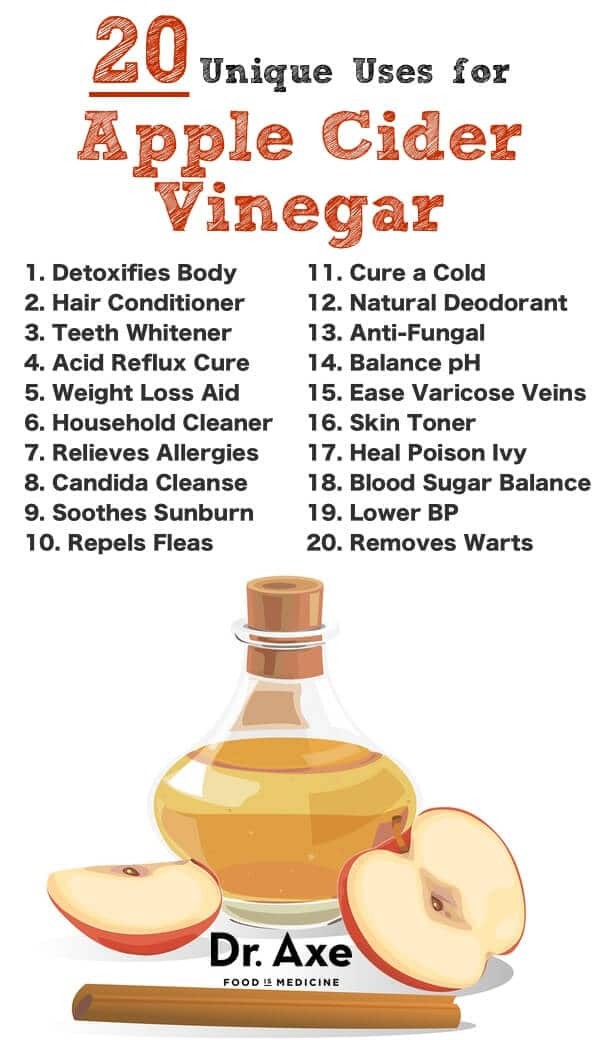
Contents
- 1 12 Ways to Use Apple Cider Vinegar (ACV) for Your Health
- 1.0.1 12 ways to use apple cider vinegar
- 1.0.1.1 1. Improve digestion
- 1.0.1.2 2. Aid weight loss
- 1.0.1.3 3. Regulate blood sugar levels
- 1.0.1.4 4. Soothe a sore throat
- 1.0.1.5 5. Boost immunity
- 1.0.1.6 6. Treat warts
- 1.0.1.7 7. Combat athlete’s foot
- 1.0.1.8 8. Ease night leg cramps
- 1.0.1.9 9. Manage PCOS symptoms
- 1.0.1.10 10. Improve cardiovascular health
- 1.0.1.11 11. Fight acne
- 1.0.1.12 12. Boost hair health
- 1.0.1.13 QUESTION
- 1.0.2 What are the risks of using too much ACV?
- 1.0.3 How can I safely consume ACV?
- 1.0.1 12 ways to use apple cider vinegar
12 Ways to Use Apple Cider Vinegar (ACV) for Your Health
Apple cider vinegar (ACV) is a popular home remedy for various ailments. Made from fermented apple juice, ACV contains important nutrients, including:
- Antioxidants
- Vitamins B and C
- Magnesium
- Manganese
- Iron
- Phosphorus
- Amino acids
While there are no clinical studies supporting health claims, anecdotal evidence suggests that the acetic acid in ACV may lower inflammation, blood pressure, and cholesterol levels, as well as regulate blood sugar.
Here are 12 ways to use ACV to boost your health.
12 ways to use apple cider vinegar
1. Improve digestion
ACV acts as a probiotic, improving digestive health by reducing symptoms of irritable bowel syndrome and inflammation. It also aids food breakdown in the digestive tract.
To start, add 1 teaspoon of ACV to a glass of water daily. If the taste is too acidic, add a little honey. Alternatively, create a drink by combining 12 oz water, 2 tablespoons ACV, ½ tablespoon lemon juice, 1 teaspoon raw honey, and ½ teaspoon ground cinnamon. Drink throughout the day for better digestion.
2. Aid weight loss
The effects of acetic acid on appetite suggest that ACV delays stomach emptying, making you feel full for longer and aiding weight loss.
Add 2 tablespoons of ACV to 16 ounces of water and sip throughout the day. Some people add lemon juice, cinnamon, and cayenne pepper.
3. Regulate blood sugar levels
ACV may help manage blood sugar levels by delaying carb metabolism in the blood. It’s especially effective after carb-rich meals. Consuming ACV before bed may lower fasting blood glucose levels.
Try adding 1 teaspoon of ACV to a glass of water and drinking it 30 minutes before meals or before bedtime, gradually increasing to 3-4 teaspoons.
4. Soothe a sore throat
Drinking diluted ACV can stop infections by creating an acidic environment. It also helps break down mucus, clear sinuses, and promote lymphatic drainage for faster recovery from colds and flu.
To soothe a sore throat, gargle a mixture of 1/4 cup ACV and 1/4 cup warm water hourly.
5. Boost immunity
ACV’s vitamins and antioxidants have anti-inflammatory properties that accelerate healing and boost the immune system. It also eliminates toxic substances from the body.
In 250 mL warm water, combine 2 tablespoons ACV, 1/4 teaspoon turmeric powder, 1/4 teaspoon ground black pepper, 1/4 teaspoon ground cinnamon, ½ tablespoon honey, and ½ tablespoon unsweetened lemon and ginger juice. Drink every morning to enhance the immune system.
6. Treat warts
ACV’s acetic acid destroys bacteria and viruses, making it a home remedy for treating warts.
Combine 1 part ACV with 2 parts water, soak a cotton ball in the solution, and apply to warts overnight. Repeat nightly until the wart falls off.
7. Combat athlete’s foot
ACV’s antifungal properties make it effective in treating fungal infections, including athlete’s foot.
Create a foot bath by combining ACV with warm water and soak for 10-20 minutes daily. You can also make an antifungal balm by combining ACV and raw honey, applying it to the affected area for 10-20 minutes before rinsing off.
8. Ease night leg cramps
Apple cider vinegar’s high potassium content makes it useful for easing night leg cramps caused by potassium deficiency.
Combine 2 tablespoons of apple cider vinegar and 1 teaspoon of honey in a glass of warm water and drink daily.
9. Manage PCOS symptoms
Studies suggest that ACV may help regulate hormones and menstrual cycles, relieving PCOS symptoms.
Add 1 tablespoon of ACV to 150 mL of water and drink after dinner for best results.
10. Improve cardiovascular health
Apple cider vinegar’s consumption has been associated with lower blood cholesterol and pressure, mitigating heart disease risk.
To add ACV to your diet, include a tablespoon of organic ACV, 1 tablespoon of olive or rice bran oil, and a teaspoon of salt in your salads.
11. Fight acne
ACV’s antibacterial properties make it helpful in maintaining skin health and preventing acne-causing bacteria.
Dilute ACV before applying to the skin. Mix 2 tablespoons of ACV, 1 tablespoon of rosewater, and 2-3 drops of essential oil in 250 mL warm water before applying to acne spots.
12. Boost hair health
ACV is used to treat frizz and promote shiny hair by smoothing and closing the hair cuticle.
Make a mixture of ACV and water, rinse hair, let it sit for a few minutes, then rinse and follow with shampoo and conditioner.
QUESTION
What are the risks of using too much ACV?
Highly acidic
Drinking undiluted ACV is dangerous as it can damage the esophagus, erode teeth, and cause nausea and other gastrointestinal problems due to its high acid content.
May lead to bone loss
Excessive ACV intake may result in low potassium levels and osteoporosis, possibly causing minerals to leach from bones. It can also lead to abnormal heart rhythms in rare cases.
Can cause skin irritation
ACV should always be diluted before applying to the skin to avoid irritation and chemical burns. Consult a dermatologist if unsure how it will affect your skin.
May interact with certain drugs
ACV can cause gastroparesis, delaying stomach emptying, which can interfere with the absorption of medications. Exercise caution if taking diuretics, insulin, blood pressure medicine, or laxatives. This is especially crucial for diabetes patients as it can complicate blood sugar management.
May worsen acid reflux
ACV’s acidity can aggravate symptoms of acid reflux and heartburn. Those suffering from these conditions should avoid consuming acidic substances, including ACV.
How can I safely consume ACV?
Exercise caution and consume ACV in moderation. Proper dosage varies depending on age, body weight, and overall health.
Start slowly and consume ACV with meals to reduce side effects. Follow these recommended dosages based on age:
- 6 to 10 years: 1/5 teaspoon (20 drops or 1 mL)
- 10 to 15 years: ½ teaspoon (2.5 mL)
- 15 to 20 years: ½ to 1 teaspoon
- 20 years or older (male): 1 to 4 teaspoons
- 20 years or older (female): 1 to 2 teaspoons
- Older than 60 years: Less than 2 teaspoons
Consult your doctor to ensure ACV is suitable for you.
Consult your doctor to ensure ACV is suitable for you.


